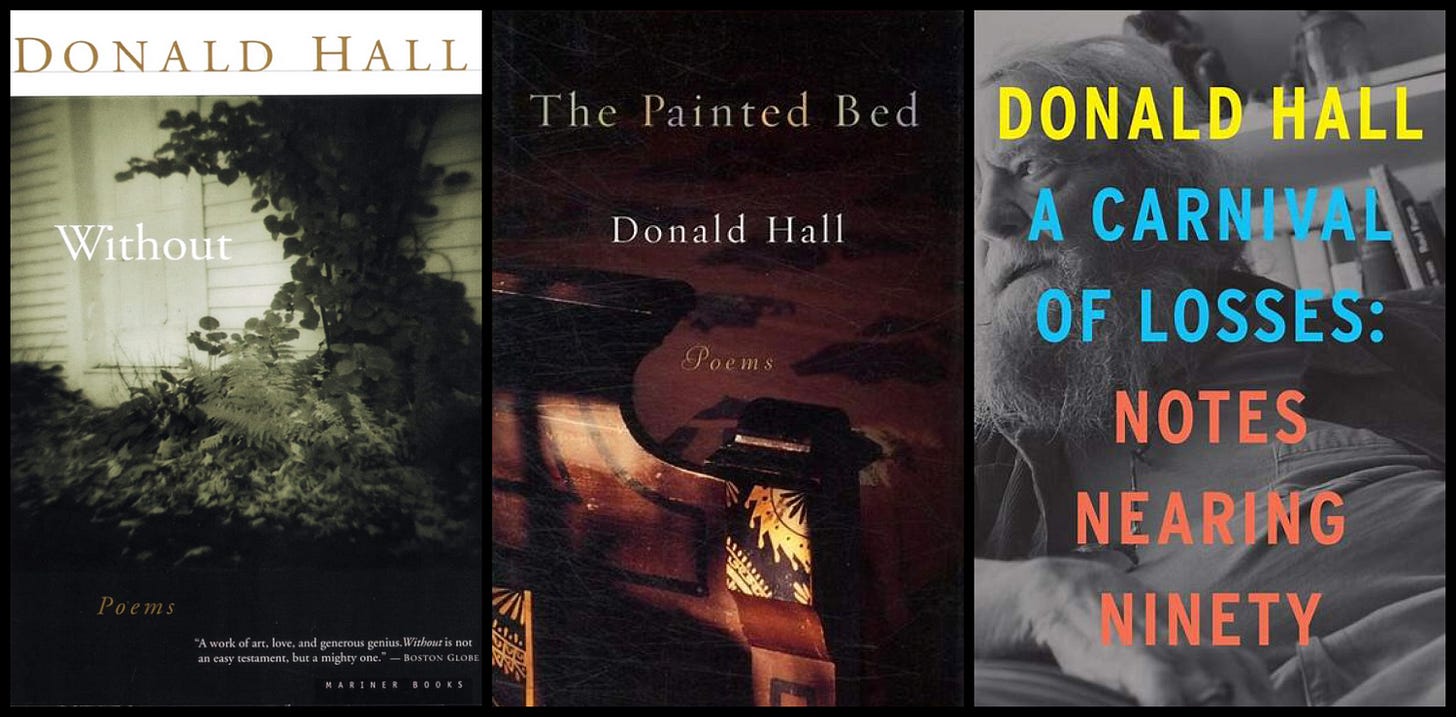Yesterday was poet Donald Hall’s birthday. He would have been 96. He passed away in 2018.
He is one of the greatest poets of the modern era and in many ways one of the most tragic. After his wife and poet Jane Kenyon died in 1995, Don wrote two collections - Without and The Painted Bed - that still sit in my body like open wounds. Without is about her death. The Painted Bed is about him trying to cope. After Jane died, his poetry, and indeed his life, became mournful and raw, intense and unforgiving.
I read both of those collections one time, and have no intention of reading them again.
Here’s a snippet from the title poem of Without:
we live in a small island stone nation
without color under grey clouds and wind
distant the unlimited ocean acute
lymphoblastic leukemia without seagulls
or palm trees without vegetation
or animal life only barnacles and lead
colored moss that darkens when months do
Early in my New Hampshire journalism career, I had the incredible honor of interviewing Don when The Painted Bed first came out. Perhaps 2002 or 2003? It was a series of two in-person interviews and then a handful of phone calls. We sat face to face in big overstuffed easy chairs in the living room of his farm house, which he and Jane called Eagle Pond Farm up in Wilmot, NH. His two kittens crawled all over us as we talked.
Especially back then, just a few short years after Jane had died, he expressed his feelings - and indeed his life - in terms of loss. He spoke openly to me about his depression, loss of appetite and seeking comfort with younger women.
And anger at the fact that before Jane had died, she had nursed him through cancer.
“For her to have gone through that with me, and then it turns out I was the one who survived…” he trailed off. He was angry that she was the one who died, not him.
The long interview was published in The Hippo. There’s no digital record of it, but I have the actual paper somewhere. I’ll have to find it. We stayed in touch off and on after that - no emails or phone calls. He wrote letters. I still have those.
I saw him again a few years later, in Feb. 2008, at an event in Concord, NH where he gave a reading with poets Charles Simic and Maxine Kumin. We met afterward. He was pleasant and friendly, but seemed frail and sad. He’d let his hair grow out wildly.
In his final book, A Carnival of Losses: Notes Nearing Ninety, published posthumously, Jane was still on his mind. He wrote:
Jane has been dead for more than two decades. Earlier this year I grieved for her in a way I had never grieved before. At eighty-six, I was sick and thought I was dying. Twenty and twenty-one years ago, every day of her dying for eighteen months, I stayed by her side. It was miserable that Jane should die so young, and it was redemptive that I could be with her every hour of every day. Last February I grieved again, this time that she would not sit over me as I died.
In retrospect, when Jane died, it seems like Don Hall died a bit as well. His work became painful and spectacular and deeply moving. His words helped him hang on as long as he did.
I have a copy of Without and The Painted Bed in my collection, both signed. But tonight, I think, I’ll instead pull out my copy of his children’s book, The Ox-Cart Man. Don won the Caldecott Medal in 1979 for that book. It tells the story of a 19th century farmer who works all year to produce enough goods to take to market with his ox and cart, where he sells everything, including the ox and the cart. He then comes home and is able to provide for his family for one more year and start the process over again.
The cycle of life. I’ll remember my friend tonight that way.
During our interview, I clearly remember my hesitancy - a new reporter interviewing a legend, struggling to put some questions to him about Jane and grief.
“Dan,” he said softly, “don’t be afraid. Ask me anything you like, directly, and I’ll answer.”
Don’t be afraid. Be direct. Ask. Words can help you live.





Oh what a sweet, yet sad, story. I remember reading the OxCart Msn to my children when they were young.
Thank you. "Without" was an enormous help to me when I had lost my own wife to cancer (that's 31 years ago now). Later, I think in his last year, I had the honor of sitting at his feet in his living room during a reading he gave there for a small group of poets. Blessed memories!